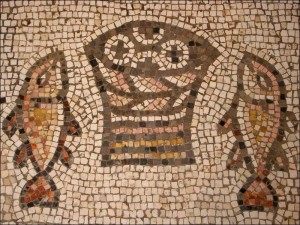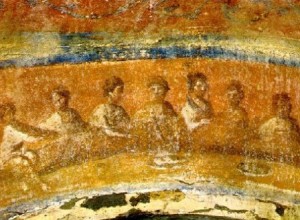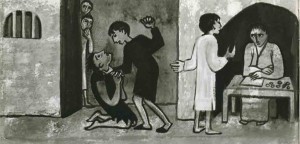“When you give a banquet, invite the poor, the crippled, the lame, the blind.” ~Luke 14:13
“Why does your teacher eat with tax collectors and sinners?” ~Matthew 9:11
“Bring in the poor, the crippled, the blind, and the lame!” ~Luke 14:21
“Here is a glutton and a drunkard, a friend of tax collectors and sinners.” ~Matthew 11:19
The gospels show us that the Kingdom of God is a big party with a bunch of losers. Jesus wants us to see that God’s idea of a great time is a huge feast with a bunch of people you wouldn’t be caught dead with on a Saturday night. Or any other time of the week. Jesus came eating and drinking with losers.
And you are one of those losers. So am I. We are all losers together at the table of our King.
We’re all coming to the table with a limp. We’ve all got a wound or a chronic pain. We come to the table with a horrible story or a distorted view or a serious issue. All of us are maimed. Or dysfunctional. Or disabled. And broken. All of us.
The Pharisees at these dinner parties — the ones “watching closely,” the ones criticizing Jesus and complaining — are so self-righteous and smug with their nice and tidy lives in their pressed and flowing robes. They set themselves apart from and above the losers. “They’re sinners; but we’re saved. Their lives are a mess; but we’ve got it all together. They need a whole bunch of God’s grace and forgiveness; we just need a little grace to get us over the top.”
No! In Luke 14, Jesus says, at these dinner parties, don’t choose a place of honor for yourself. You’re not as great as you think you are. And these people you categorize as losers are my cherished children.
We are all sinners, every one of us. We have all sinned and fallen terribly short of the glory of God. And we are all being saved together by the lavish grace of our Father. Yes, the ground is level at the foot of the cross. And, yes, all the seats are the same around the table of our Lord.
Scripture says we’re all going to eat and drink together with Jesus forever. We’re all going to take our places with him around the table at the wedding feast of the Lamb. And I think Sundays are the warm-up. I think Sunday mornings are party practice. Sunday mornings together are like the chips and hot sauce to the fajitas and enchiladas. Eating and drinking with sinners, sharing a meal with broken losers, with each other, together on Sundays, teaches us how to live together. It’s one of the places we learn to bear one another’s burdens. We learn to help each other, to encourage each other, to challenge each other.
We look at all the faces around the Lord’s Table on Sundays and they’re all looking back at us. No doubt, seeing very clearly our messes, knowing fully our sins. And, yet, still choosing to eat and drink with us. And we know at that moment that Jesus was crucified for the lousy company he kept. And he still is.
Peace,
Allan








Recent Comments